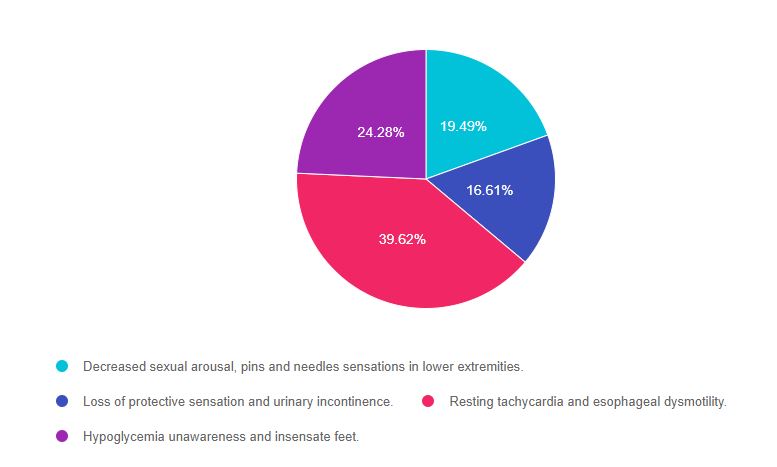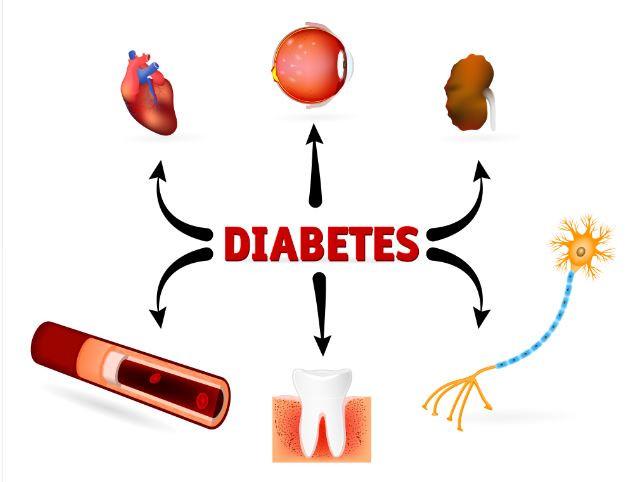
For our August 17th Question of the Week, 39% of respondents chose the best answer. This is due in part to our error. We mis-keyed the best answer for the first 96 respondents (we quickly fixed it as soon as we discovered the error). So, you may want to retake this question before you read on to discover the answer. Coach Bev sincerely apologizes if this caused any of you distress! But today, we are making it right. Thanks for your patience and ongoing participation!
Before we start, if you don’t want any spoilers and you tried the question on Tuesday morning, you can answer below: Answer Question
Question 1: Which of the following are considered diabetes autonomic neuropathies?
- Decreased sexual arousal, pins and needles sensations in lower extremities.
- Loss of protective sensation and urinary incontinence.
- Resting tachycardia and esophageal dysmotility.
- Hypoglycemia unawareness and insensate feet.

As shown above, the most common choice was option 3, the second most common answer was option 4, then option 1, and finally option 2.
Getting to the Best Answer
If you are thinking about taking the certification exam, the content of this practice test question will set you up for success. Don’t forget to leverage your common sense and vast health care knowledge to get the best answer for specialty topics like microvascular disease. Be familiar with nerve disease presentation and screening as listed in the ADA Standards of Care on Microvascular health and treatment options. We also invite you to join our webinar (see below). Also, the tests will often provide a 2 part answer, one part being correct and the other part incorrect. Of course, if any part of the answer is incorrect, it is not the best answer. A great test taking tip to hold onto to when your sympathetic nervous system is in full gear. You got this, Coach Beverly
A note on Autonomic Neuropathy. This condition causes nerve damage to the autonomic nervous system which is in charge of digestion, sexual function, heart rate, and the adrenergic flight or fight response. The autonomic nervous system also “oversees” the energy-conserving parasympathetic response including bladder control, heart rate slowing, eye pupil constriction, and more.
Answers & Rationale
Answer 1 is incorrect, 19.49% chose this answer, “Decreased sexual arousal, pins and needles sensations in lower extremities.” This is a juicy answer. Autonomic dysfunction can affect sexual function, but it doesn’t affect libido or sexual desire. In addition, the pins and needles sensation is due to the nerve damage associated with peripheral neuropathy. Since both parts of this answer aren’t correct, this answer is false.
Answer 2 is incorrect, 16.61% of you chose this answer, “Loss of protective sensation and urinary incontinence.” Loss of protective sensation is associated with peripheral neuropathy. However, urinary incontinence is often a result of autonomic neuropathy. Since both parts of this answer aren’t correct, this answer is false.
Answer 3 is correct, 39.62% of you chose this answer, GREAT JOB! “Resting tachycardia and esophageal dysmotility.” Elevated heart rate while resting is a concerning sign and is often associated with cardiac autonomic neuropathy and increased risk of a cardiac event. Autonomic neuropathy can affect the motility of the entire GI track, including the esophagus. The more commonly recognized GI autonomic neuropathy is gastroparesis. Since both conditions, resting tachycardia and esophageal dysmotility, are associated with autonomic neuropathy, this is the best answer.
Answer 4 is incorrect, 24.28% of you chose this juicy answer “Hypoglycemia unawareness and insensate feet.” Since hypoglycemia unawareness is associated with a diminished adrenergic response to low blood glucose levels, it is considered an autonomic neuropathy. However, insensate feet are due to peripheral nerve damage associated with ongoing hyperglycemia. Since both parts aren’t correct, this answer is false.
We hope you appreciate this week’s rationale! Thank you so much for taking the time to answer our Question of the Week and participate in this fun learning activity!
Want to learn more about this topic?
Join us for our
Level 2 | Microvascular Complications, Eye Kidney, & Nerve Disease Standards | 1.5 CEs

This course provides you with the need-to-know information regarding the microvascular complications of diabetes. We start with a brief overview of the pathophysiology and clinical manifestations then sum up with prevention strategies and screening guidelines. This straight-forward program will provide you with information you can use in your clinical setting and also provides critical content for the diabetes educator exam.
Objectives:
- Eye, kidney and nerve disease
- Modifiable and non-modifiable risk factors for diabetes complications
- Screening guidelines and prevention strategies.
See Full Calendar for upcoming webinars and events.
Can’t make it live? All paid registrants are guaranteed access to the video presentation, handouts and podcasts.
Sign up for Diabetes Blog Bytes – we post one daily Blog Byte from Monday to Friday. And of course, Tuesday is our Question of the Week. It’s Informative and FREE! Sign up below!
[yikes-mailchimp form=”1″]Accreditation: Diabetes Education Services is an approved provider by the California Board of Registered Nursing, Provider 12640, and Commission on Dietetic Registration (CDR), Provider DI002. Since these programs are approved by the CDR it satisfies the CE requirements for the CDCES regardless of your profession.*
The use of DES products does not guarantee the successful passage of the CDCES exam. CBDCE does not endorse any preparatory or review materials for the CDCES exam, except for those published by CBDCE.









